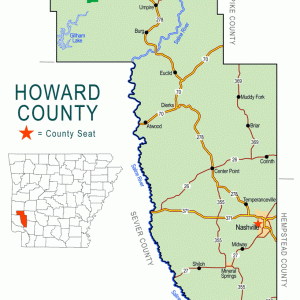calsfoundation@cals.org
Tollette (Howard County)
| Latitude and Longitude: | 33°49’11″N 093°53’40″W |
| Elevation: | 361 feet |
| Area: | 0.96 square miles (2020 Census) |
| Population: | 185 (2020 Census) |
| Incorporation Date: | July 27, 1972 |
Historical Population as per the U.S. Census:
|
1810 |
1820 |
1830 |
1840 |
1850 |
1860 |
1870 |
1880 |
1890 |
1900 |
|
– |
– |
– |
– |
– |
– |
– |
– |
– |
– |
|
1910 |
1920 |
1930 |
1940 |
1950 |
1960 |
1970 |
1980 |
1990 |
2000 |
|
– |
– |
– |
– |
– |
– |
– |
407 |
316 |
324 |
|
2010 |
2020 |
|
|
|
|
|
|
|
|
|
240 |
185 |
|
|
|
|
|
|
|
|
Tollette is a largely African-American town on State Highway 355 in southwestern Howard County. In the 2010 census, the population of Tollette consisted of 232 African Americans, seven whites, and one Native American.
Caddo lived in the area long before the first European explorers arrived. The Caddo were eventually moved to Indian Territory, now the state of Oklahoma. In 1837, Robert Baber and Matthew Gray both acquired land in the area around what would become Tollette. Baber had arrived in Hempstead County in about 1824; his son Daniel would serve in the Confederate army during the Civil War, and afterward Daniel Baber helped found the town of Athens (Howard County).
Tollette is named for the two oldest sons of Stephen Tollette—Stephen and Sanford. The elder Stephen Tollette was a freed slave who moved after the Civil War from Virginia to Arkansas. When Howard County was formed in 1873, a community of African Americans had already developed, with former slaves purchasing available farmland. Sanford Tollette helped organize the community, which is said to have consisted of more than 600 residents by 1885.
In 1891, Sanford Tollette applied for a post office, which he wanted to name Toltec. The post office was granted, but his last name was used rather than Toltec. The community had a Baptist church and a Christian Methodist Episcopal (CME) church, as well as a grocery store, a general store, two cotton gins, a grist mill, a blacksmith shop, and a physician’s office. An acre of land was set aside for a school in 1900, and Tollette had a two-room school by 1913.
In 1927, the school was replaced by a Rosenwald school known as the Howard County Training School. In 1933, a Church of God was established in Tollette. New Deal efforts during the Depression included lectures by officials of the Agricultural Adjustment Administration, community involvement in canning fruits and vegetables, and vaccination of cattle to eradicate tuberculosis. The Rosenwald school was destroyed by fire in 1936, but a new school building was built with the help of the Works Progress Administration (WPA).
By 1960, Tollette had two cafés, two grocery stores, and a general goods store. A town festival, first attempted in 1958, was firmly established in 1960 as Tollette Homecoming. It continues to be held in even-numbered years during the month of August. A blues festival was later made part of the celebration.
Desegregation and school consolidation closed the training school in 1970. Seeking to recover from this blow, the town was incorporated in 1972. The new town government leased the abandoned school building and oversaw the addition of street lights, paved streets, fire protection, and police protection. A daycare center and a ballpark were also added to the town. A sewage system was built in the 1980s and dedicated in 1993. Loans were provided to low-income families to help them afford new housing.
Comedian and actress Luenell Batson is a native of Tollette; she was inducted into the Arkansas Black Hall of Fame in 2015.
For additional information:
Howard County Heritage Club. Howard County Heritage. Dallas, TX: Taylor Publishing Company, 1988.
Tollette. Vertical Files. Butler Center for Arkansas Studies. Central Arkansas Library System, Little Rock, Arkansas.
Steven Teske
Butler Center for Arkansas Studies





Comments
No comments on this entry yet.